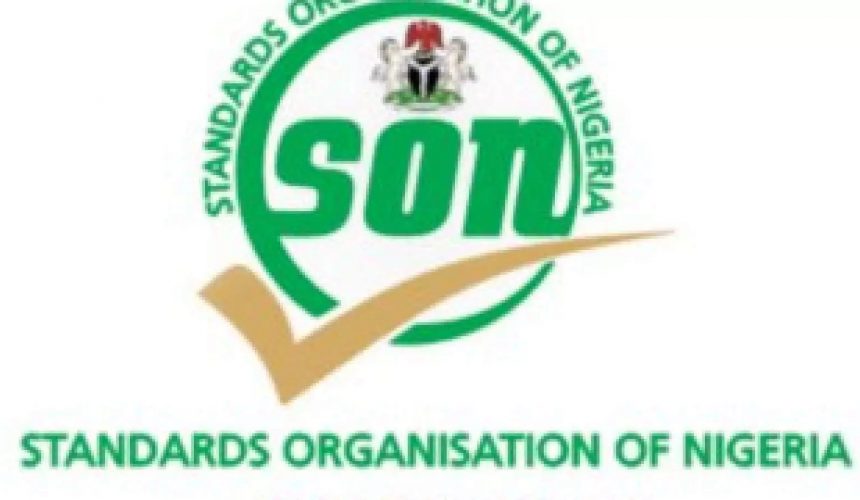At the recently held MARKETING EDGE Brands and Advertising Awards of Excellence, the Standards Organisation of Nigeria, SON, emerged as the Outstanding Statutory Agency of the Decade. This, in the words of the MARKETING EDGE Awards Board, was “a loud attestation to the very high equity height which the SON has attained in its statutory calling; and the splendid record of achievements which it has chalked up, especially in the last one decade”; adding that the agency’s citation “depicts a profile in regulatory excellence and is loaded with a very exciting record of verifiable achievements”.
Historically speaking, Standards Organisation of Nigeria, SON, was established by an Enabling Act No. 56 of 1971 – THE STANDARDS ORGANISATION OF NIGERIA ACT CAP 412 of the laws of Federal Republic of Nigeria. The Act has since been amended several times (Act No. 20 of 1978, Act No. 32 of 1984 and Act No. 18 of 1990). SON is currently governed by the Standards Organisation of Nigeria (Repeal and Re-enactment) Act of 2015.
Its statutory functions are contained in Section 5 of the SON Act 2015, and they include to:
- a) Organize test and do everything necessary to ensure compliance with standards designated and approved by the council
- b) Undertake investigation as necessary into quality of facilities, systems, services, materials and product, whether imported or manufactured in Nigeria;
- c) Evaluate quality assurance, including certification of systems, products and laboratories throughout Nigeria;
- d) Ensure reference standards for calibration and verification of measures and measuring instruments; and shall, with respect to metrology-
- Realize and disseminate the units of physical measurement based on the International System (SI Units) under the weights and Measure Act,
- Establish, keep, maintain, develop and update the Nigerian national primary and Reference (Secondary and Tertiary) Standards of Measurement for the SI Units traceable to international standards,
- Ensure that working standards used in Nigeria are traceable to the National Standards kept by the Organisation,
- Establish, develop and maintain a National physical Laboratory for measurement expertise and infrastructure necessary to enable business, technology and academia to take advantage of the advances in the field of measurement, and
- Provide measurement and calibration services to industry and government;
- e) Compile an inventory Industrial Standard specification;
- f) Develop methods for testing materials, supplies and equipment, including items purchased, whether locally manufactured or imported, for use of department of Government of the Federation or a State and private establishment;
- g) Establish an import and Export Product Surveillance, Certification and Conformity Assessment Scheme;
- h) Establish a mandatory conformity assessment programme for locally manufactured products in Nigeria;
- i) Impose fees, fines or penalties on a person who contravenes any Import or Export Surveillance, Certification or conformity Assessment scheme;
- j) Register and regulate standards, marks and certification;
- k) Undertake registration of all manufactured products distributed marketed and consumed throughout Nigeria;
- l) Undertake preparation and distribution of standards samples;
- m) Establish and maintain such number of laboratories or other institution as may be necessary for the performance of its function under this act
- n) Compile and publish general scientific or other data
- o) Advise department of the Government of the Federation, State and local on specific problems relative to standard specification; etc.
Significantly, SON has a dedicated MSMEs Desk to assist MSMEs with necessary information to enhance compliance to Standards and conformity assessment.
In this regard, the under listed incentives are available to support MSMEs’ compliance to Standards and Conformity Assessment to enhance quality of products and services:
- 25% discount on the sale of Standards to MSMEs,
- Subsidized Certification charges,
- Subsidized Laboratory testing charges,
- SONCAP import permit at subsidized service charge for importation of raw materials and equipment
- Inclusion in all Technical Committees on Standards elaboration.
- Recommendation of MSMEs with Certified products for financing
NIGERIAN INDUSTRIAL STANDARDS
A Nigerian Industrial Standard (NIS) is a precise and authoritative document established by consensus and approved by the Nigerian Standards Council prescribing necessary criteria to ensure that a material, product or procedure is fit for the purpose for which it is intended. A Nigerian Industrial Standard, for example, falls into categories, namely, Terminology standards, Dimensional standards, Performance standards, Testing standards, Product standards, Codes of practice, Process standards, Service standards and Measurement standards.
Nigerian Industrial Standards are formulated in line with international best practices by Technical Committees. The Technical Committees are constituted from groups of relevant experts and other stakeholders in the private and public sectors – representatives of Government Agencies, Testing laboratories, Consumer Associations and Academia/Research Institutions – and from International Governmental and Non-Governmental Organisations.
Benefits of Implementing Nigerian Industrial Standards
Below are benefits to be derived from implementing the Standards:
– They provide useful tools in quality assurance, safety assurance, waste
Management and cost reduction.
- Standards serve as a guide for meeting minimum specifications in production of goods and services, and
- Standards provide the basis for trade transactions.
- PRODUCT CERTIFICATION: SON’s Product Certification schemes are third party assessments of products and processes to confirm conformance to requirements of the relevant specifications or standards. There are four main product certification schemes operated by the Organisation through the Product Certification Directorate. These are:
- Mandatory Conformity Assessment Programme (MANCAP)
- Voluntary Product Certification Scheme (NIS Mark of Quality)
- Nigerian Quality Award Scheme (NQA), and
– Product-Type Certification for Exports.
SON Certification Marking Scheme: To bring the advantages of Standardisation within the reach of all consumers, the Standards Organisation of Nigeria (SON) operates Certification Schemes to promote global competitiveness among domestic manufacturers and organizations through compliance with the requirements of the relevant Nigerian Industrial standards or equivalent international standards.
Mandatory Conformity Assessment Programme (MANCAP):
MANCAP Compliance Procedures
The procedures for MANCAP certification involve inspection of the production processes, sampling and testing of the products against the relevant Nigerian Industrial Standards (NIS) to confirm compliance through conformity assessment processes. Report of inspections and test results are compiled by State Offices and forwarded to Product Certification Directorate for evaluation and recommendation for SON Management’s approval for certification.
If the product meets the requirement of the relevant Nigerian Industrial Standard, MANCAP certificate and MANCAP logo which bears a unique number for that product are issued for the product upon payment of applicable administrative charges. A MANCAP certificate is valid for three years after which the product must undergo recertification.
MANCAP objectives include the following;
- To ensure that all locally manufactured products conform to relevant National Standards (NIS)
- Aims at protecting Manufacturers against counterfeiting and unfair trade practices and to encourage investment.
- Aims at protecting consumers against substandard and unsafe products.
- To prevent dumping of unsafe and substandard products in Nigerian markets.
- To give consumers confidence that locally manufactured goods are fit, safe and will meet intended use.
LABORATORY SERVICES
Testing services are the core activity of the Directorate of Laboratory Services. The Directorate provides testing facilities to enable the effective performance of quality assurance activities during the implementation of standards. The tests carried out are mainly third party conformity assessment of products using the relevant Nigerian Industrial Standards or any other applicable international standards. In order to ensure that locally manufactured food products meet both local and International and national quality requirements, the SON accredited laboratories carry out analysis for both accredited and non-accredited parameters under the same accredited environment to ensure generation of technically valid data.
Samples tested in our laboratories include samples obtained from routine inspections, enforcement activities, product registration and consumer complaints, or samples submitted by customers who want to ascertain the quality of their products, or those obtained at various ports/borders during inspections, among others. All aspects of Laboratory Services conform to the requirements of the International Standard ISO 17025 and internal laboratory manuals.
PRODUCT REGISTRATION: As part of the zero-tolerance to substandard products programme, Standards Organisation of Nigeria (SON) undertakes registration of both locally manufactured and imported products. The programme is primarily designed to provide data or inventory of products and their specified quality parameters. It also provides information about the manufacturer or importer and therefore affords traceability of the product, especially when considering specific quality requirements and consumer advocacy/protection. This function is undertaken by the Product Registration department of SON.
The registration process is electronic (e-Product registration), which makes it convenient for the manufacturer/importer as it can be done on-line anytime and anywhere with ease. Other benefits of the programme for the manufacturer/importer include:
Full details of the e-Product Registration process are available via the SON website (www.son.gov.ng).
TRAINING AND TECHNICAL ADVISORY SERVICES: SON under its nationwide training scheme organizes seminars, workshops, conferences and training in areas of Quality Assurance and various Management Systems for commercial, industrial (Importers, Manufacturers, and Exporters etc.) and public institutions. SON conducts training to support organizations in the understanding and use of standards to enable them access the benefits for their organization or sector. In-house programmes, particularly on Quality Management and Environmental Management Systems, are organized upon request by interested stakeholders.
METROLOGY SERVICES: The SON is the custodian of the National Primary Measurement Standards in the country and has been officially designated as the National Metrology Institute (NMI) of Nigeria. Calibration services are presently offered to industries, government agencies, research and testing laboratories in various fields of metrology namely; mass, length, temperature and pressure. The laboratories are undergoing the process of accreditation and State-of-the-art equipment was purchased and personnel trained in renowned NMIs across the globe.
MANAGEMENT SYSTEMS CERTIFICATION: The accredited Management Systems Certification (MSC) Directorate administers the certification scheme for quality, environment, food safety, occupational health and safety management. This entails third party certification services to organizations that establish, implement and maintain a management system that conforms to the requirements of the applicable management system standard. SON ensures that the personnel performing work related to the certification, including Auditors and persons making certification decisions, are competent and experienced in line with international best practice. The Directorate has certified over 500 Organisations spread all over the country to the various Management system standards:
STANDARDS ORGANISATION OF NIGERIA CONFORMITY ASSESSMENT PROGRAMME (SONCAP): The programme is a set of conformity assessment and verification procedures applicable to SON regulated products imported into Nigeria.
Leading the Standards Organisation of Nigeria, as its Director General/Chief Executive is Mallam Farouk A. Salim, a graduate of Pharmacy from the Ahmadu Bello University Zaria and holder of a Master of Business Administration (MBA) from the Washington University, St. Louis, Missouri, USA.
With an upwardly mobile career that began at the Nassarawa Hospital, Kano, from where it progressed to Glaxo Pharmaceuticals, Lagos, and extending to the United States of America (in 1989) where he worked variously with different organisations in Missouri and Illinois before his appointment as the Director General, SON, Mallam Salim’s core competencies cover organisational restructuring, quality assurance and management as well as project management; and is imbued with a vision “to bring changes by promoting public safety, the role of standards in local manufacturing, import and export as well as creating an enabling environment for innovations that will stimulate national self-sufficiency”.





Comment
No comments found.